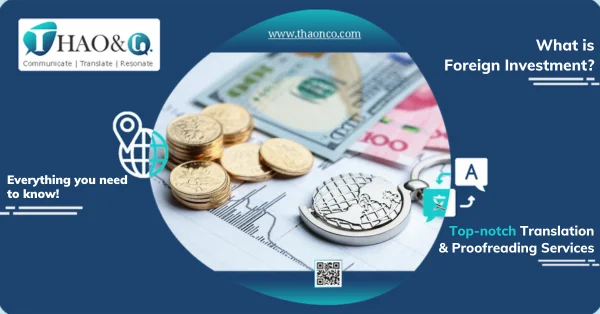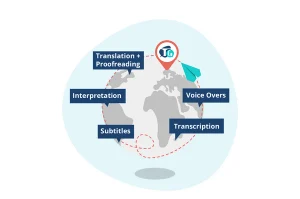There has been a significant growth in foreign investment recently because of the numerous benefits it brings to the market. This article by Thao & Co. provides detailed information about foreign investment in Vietnam.
Foreign investment refers to the allocation of capital by an investor into projects of a foreign country with the aim of generating profits. This kind of investment helps boost economic growth and paves the way for foreign businesses to thrive.
To gain a detailed insight into foreign investment, it’s essential to familiarize yourself with the following key terms:
Foreign investment capital is the capital poured into another country to expand infrastructure, business models, or develop other projects in the recipient country.
Based on the business model, the foreign capital will be allocated accordingly. However, the ultimate goal of this capital movement is to achieve the desired financial returns.
Foreign investors are individuals or organizations that invest in projects outside their home country. This investment can generate substantial profits.
Learn more: How to obtain an investor visa for foreigners in Vietnam 
Foreign-invested enterprises are companies that receive capital from foreign investors to finance and conduct their operations. They must conduct their activities in accordance with the host country’s law while still retaining the right to supervise and manage the businesses.
This is an economic sector funded by investors from other countries. By providing capital, the investors will be entitled to establish and manage businesses in the host country.
Investors can engage in foreign indirect investment by purchasing shares and securities of foreign companies. While indirect investment won’t grant them the right to directly manage or operate the businesses, the main purpose still lies in generating financial returns. Learn more: What is a Global Citizen? Examples and Essential Skills
The value difference between foreign investments made by a country’s residents and domestic investments made by foreign residents is called net foreign investment. The comparison is typically measured over a specific period, usually a year.
Foreign direct investment is also referred to as FDI. When the investor makes a direct investment, the capital will be used to establish manufacturing facilities and enterprises abroad. This way, the investment could be sustained for the long term, and the investor can take on the role of a direct supervisor of the business. Related article: Internationalization vs. Globalization: Is there any difference?
 As foreign investment has become more widespread, the challenges it brings in are undeniable. Recognizing these challenges and turning them into opportunities for growth can lead to long-term success. Here’s an overview of the key opportunities and challenges of foreign investments:
As foreign investment has become more widespread, the challenges it brings in are undeniable. Recognizing these challenges and turning them into opportunities for growth can lead to long-term success. Here’s an overview of the key opportunities and challenges of foreign investments:
Foreign investment cooperation involves parties from different countries, so international communication plays a crucial role in this. Investors must pay close attention to languages and information exchange to ensure a smooth process.
Contracts must be handled with utmost care, and documents must be translated accurately, so there won’t be any future mistakes or disagreements. Besides, professional interpretation for business negotiations and precise translation of business documents are needed to achieve success.
Therefore, finding a professional translation partner is essential to help you navigate those complexities. Accurate translation ensures you can yield the desired outcome and avoid legal pitfalls.  Currently, it’s not difficult to find a translation partner, but there are certain factors to consider:
Currently, it’s not difficult to find a translation partner, but there are certain factors to consider:
To guarantee a pleasant experience and translation efficiency for your investment project, Thao & Co. is your perfect companion.
Our services have been praised by clients for the exceptional quality and affordable prices. Click on Contact Us to receive a free consultation today!